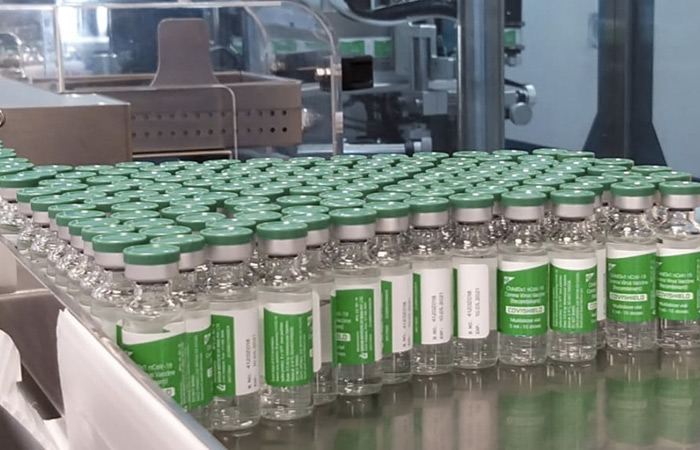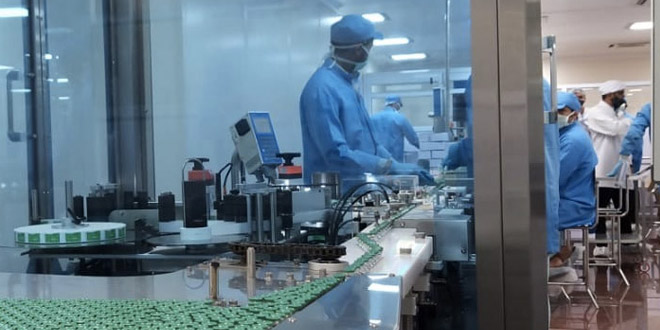Highlights
- India is set to begin its vaccination drive from tomorrow (Jan 16)
- SII is the largest vaccine manufacturer in terms of number of doses made
- Per day, 24 lakh doses of Covishield are being produced
New Delhi: NDTV takes a look at some behind-the-scenes action from the Serum Institute Facility in Pune that is manufacturing one of the approved vaccines in the country – Covishield that has been developed by AstraZeneca-Oxford University.
The nationwide COVID vaccination drive was launched by Prime Minister Narendra Modi on January 16 through a video-conference. In an exclusive interview with NDTV, Adar Poonawalla, CEO, Serum Institute of India (SII) explains how the vaccine is being manufactured from the facility and how it is reaching the last mile stop in our country where it will finally be administered to the healthcare workers and frontline warriors starting tomorrow. According to the health ministry of India, some three lakh health workers will receive shots on the first day of the vaccination drive and over the period of next few months, around 3 crore people will be covered in the first phase of the vaccination drive.
Also Read: One Day To Go For India’s Massive COVID-19 Vaccine Rollout, Centre Sends Rulebook To States

The COVID vaccination drive will begin with 3,006 sites that will be virtually connected during the weekend launch. The government has also said that as the programme progresses, the number of sites will be ramped up to 5,000 and more
NDTV: How many people can be inoculated from one vial of vaccine?
Adar Poonawalla: You can inoculate around 10 people using one vial of Covishield vaccine. The only thing to know or keep in mind is that once we open this vial, we will have to make sure it is used within 3-4 hours.
NDTV: Explain the scale at which the vaccines are currently being manufactured at the Serum Institute of India?
Adar Poonawalla: We are producing 5,000 doses of Covishield per minute here. Per day, 24 lakh doses of Covishield are being produced by the facility. We have got three shifts working around the clock at the facility and that’s the reason why we can get those numbers out. The next challenge in front of us is storing so much of the material and dispatching it in the coming few months as we progress with the vaccination drive.
NDTV: Explain the kind of facility and the requirements here that are needed to manufacture Covishield?
Adar Poonawalla: This is just the normal air-conditioned facility as it is easier to manufacture in this environment and that’s the reason why we have partnered with some specific firms like Oxford, Novavax etc. These vaccines can be stored and handled easily at 2-8 degrees. If this was one of the other facilities where we have to handle and keep the vaccine in minus 20 or 70 temperatures, or very cold temperatures, that would have been very difficult and that would have slow down the whole production process as well.
Also Read: Does People Who Have Contracted COVID In Past Need To Get Vaccinated? An Expert Explains
NDTV: What’s the scale of the vaccination drive in India that we are looking at when compared to other countries?
Adar Poonawalla: We have dispatched 11 million doses a day to roll out the vaccination programme in India from January 16. We will probably end up supplying 40-50 million doses in the next two months. If we compare this scale with the USA, they reached this figure in over one and half months time, something, which we here are being able to do in two or three days. So, that just shows, India’s capability in doing so and there are many other Indian vaccine manufacturers as well that can do this. So, it is definitely a great moment for India and it just shows how prepared we all are in the fight against COVID-19.
NDTV: Will the supply of vaccine be affected in India in the coming few months given we have the large number of population to vaccinate?
Adar Poonawalla: India’s supply of vaccine will not be affected, there will be plenty of vaccine to go around and we will ensure there is vaccine for everybody.
NDTV: Given this rate of manufacture, why can’t we buy the vaccine as supposed to be waiting for the government to supply it to us?
Adar Poonawalla: The government has decided to first immunised all the healthcare workers, frontline warriors and people above 50-years of age or people with comorbidities, the most vulnerable group, approximately 30 crore people, in the first phase of coronavirus vaccination drive. Hopefully, this will be covered in one or two months of time and then the government will give us permissions to go ahead and operate in private hospital sales and market sales.
NDTV: What will be the cost of the vaccine in the coming months?
Adar Poonawalla: The MRP for the vaccine will be Rs 1000 for the single dose of vaccine and Rs 2000 for the entire course, which is two doses.
NDTV: What’s the recommendation of the doses of Covishield vaccine?
Adar Poonawalla: The Covishield vaccination course consists of two doses of 0.5 ml each. The second dose should be administered between four to six weeks after the first dose. The minimum number of days we are looking at 28 and the optimum number is 3 months, we would like to give that choice to the public.
NDTV: When will people eventually go and buy this drug and what will it look like?
Adar Poonawalla: Currently, we are using the private sector, corporates, private hospitals and other avenues, for example, a large company through their corporate social responsibility (CSR) initiative can buy the vaccine for its employees or families, NGOs and other big organisations, where basically a large population will be covered. And eventually, after March or April, one will be able to get it at any local chemist shop or retail chain, where you can just walk-in and buy the vaccine and then you go to your doctor to get vaccinated.
Presently, SII delivers 1.6 billion doses of vaccines around the world. This will be increased by a further 1 billion doses by the end of the year. SII is in collaborations to manufacture three COVID-19 vaccine candidates other than Covishield which has been cleared. These include Novavax, Codagenix (nasal) and RBD-Spytech.
NDTV – Dettol Banega Swasth India campaign is an extension of the five-year-old Banega Swachh India initiative helmed by Campaign Ambassador Amitabh Bachchan. It aims to spread awareness about critical health issues facing the country. In wake of the current COVID-19 pandemic, the need for WASH (Water, Sanitation and Hygiene) is reaffirmed as handwashing is one of the ways to prevent Coronavirus infection and other diseases. The campaign highlights the importance of nutrition and healthcare for women and children to prevent maternal and child mortality, fight malnutrition, stunting, wasting, anaemia and disease prevention through vaccines. Importance of programmes like Public Distribution System (PDS), Mid-day Meal Scheme, POSHAN Abhiyan and the role of Aganwadis and ASHA workers are also covered. Only a Swachh or clean India where toilets are used and open defecation free (ODF) status achieved as part of the Swachh Bharat Abhiyan launched by Prime Minister Narendra Modi in 2014, can eradicate diseases like diahorrea and become a Swasth or healthy India. The campaign will continue to cover issues like air pollution, waste management, plastic ban, manual scavenging and sanitation workers and menstrual hygiene.
[corona_data_new]






























